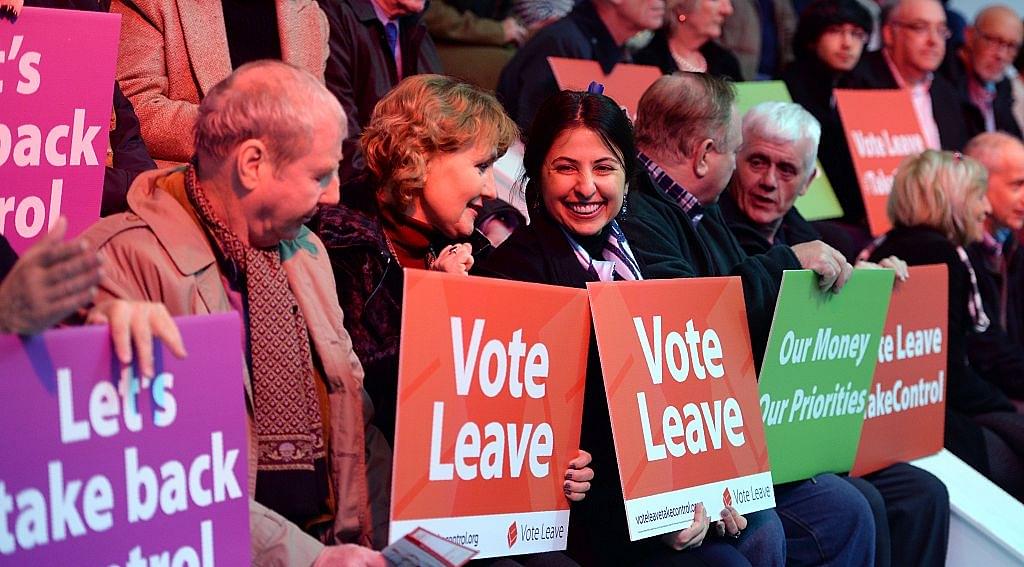World
Why Brexit Is An Idea Worth Trying
- Brexit may have short-term costs, but it will give Britain the option for more directly working for its interests. And faster.

A “Leave” rally (OLI SCARFF/AFP/Getty Images)
If Britons vote to get out of the European Union, which seems unlikely given the tendency of people to get frightened by the unknown, they would be doing the right thing.
Not because there will be no turbulence. Not because there will be no short-term economic damage. Not because the EU has no flaws. Those are things that might frighten Britons to vote “Stay”.
But the reasons to leave are many – and they are inter-related.
One reason is that power is being centralised far away from where people live and work, in Brussels, where the organisation is headquartered, and in Berlin, where the most powerful member calls the shots.
Another reason is that the EU has become self-absorbed and bureaucratic, heading towards over-regulation. A Britain out of EU will be able to improve the ease of doing business that suits its economy.
A third is that the EU has become too big to be governed efficiently: with 28 members, the EU cannot decide fast on any issue.
A fourth is the loss of national sovereignty, which the “Leave” campaigners on Brexit are emphasising. In a world that should be pushing decisions lower down, the EU is trying to do the opposite. The EU did not want Greece to ask its own voters whether they should reject the take-it-or-leave-it deal on a rescue. The EU is effectively becoming anti-democratic. The Germans are already warning British voters that if they opt out, they will not go slow on working out a trade deal. Britons should ignore the threat.
A fifth reason is that trade blocs like the EU are effectively supplanting the multilateralism that created the World Trade Organisation. Trade will become more complex if future trade deals are negotiated between powerful trade blocs rather than multilaterally.
A sixth reason is lack of freedom to do more direct deals. A Britain that’s out of the EU can do deals with China or India or Asean that is beneficial to both sides. Now, such deals are possible only if the EU thinks it is good for all of the EU. Staying in the EU reduces every country’s scope for manoeuvre.
Seventh comes immigration. As part of the EU, Britain has no scope to decide what kind of immigration it will allow and what it won’t.
Reason number eight is that the exit option needs testing. If, like Hotel California, one can only enter and not exit, the EU is a bad, bad idea.
The fact that Britain has done well by staying out of the common currency testifies to the viability of the Brexit option. If the pound sterling is a viable currency, and so is the Swiss franc, Brexit will be viable too.
The euro fiasco, where the northern parts of the EU grew stronger at the cost of the southern parts, shows what over-centralisation can do.
The logic of the EU was political – to submerge Europe’s old tribalisms into a broader economic community that will bring peace.
That idea has been achieved. With the Cold War over, and with Communism too mutating to adopt market-based approaches, the political purpose of an economic community is over. It is unlikely that any major member of the EU would ever go to war with another member; the only exceptions are countries outside the EU – especially former Soviet republics like Ukraine or Georgia, which Russia feels is its legitimate sphere of influence.
It is worth recalling that national sovereignty is not an idea past its sell-by date. Just because post-World War II Europe scrambled to create a trade bloc, and the scrimmage accelerated after the fall of the Berlin Wall, it does not mean this is the only game in town. Free trade benefits look good at the macro level, but these benefits are shared unevenly among traders, since there is something called “terms of trade”. Every country should have the right to decide where it will trade freely and where it won’t.
Brexit may have short-term costs, but it will give Britain the option for more directly working for its interests. And faster.
An exit can always be reversed. Not knowing whether an exit may have been better will create a permanent doubt in Britons’ minds about whether they did right by staying in. It is a risk worth taking.
Introducing ElectionsHQ + 50 Ground Reports Project
The 2024 elections might seem easy to guess, but there are some important questions that shouldn't be missed.
Do freebies still sway voters? Do people prioritise infrastructure when voting? How will Punjab vote?
The answers to these questions provide great insights into where we, as a country, are headed in the years to come.
Swarajya is starting a project with an aim to do 50 solid ground stories and a smart commentary service on WhatsApp, a one-of-a-kind. We'd love your support during this election season.
Click below to contribute.
Latest